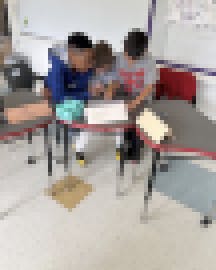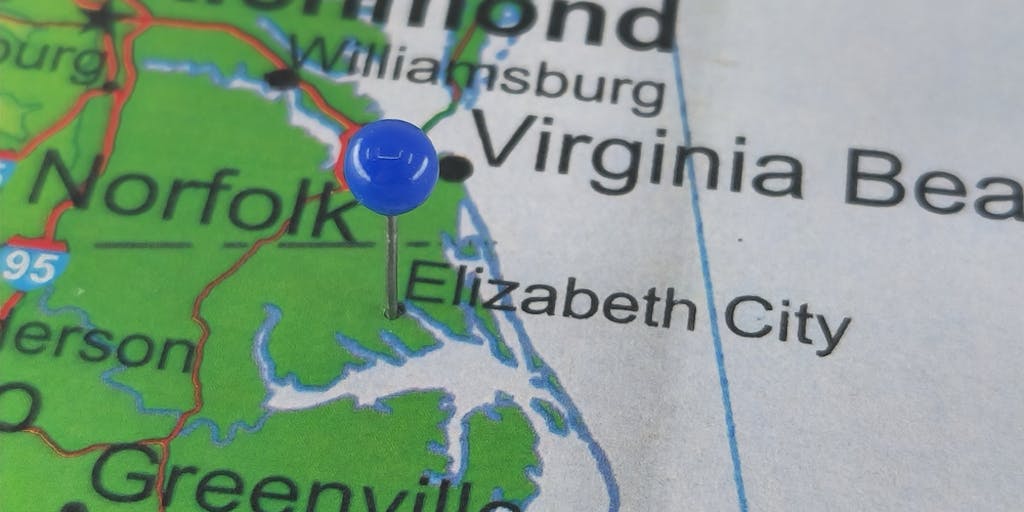Elijah, a rising sixth grader, was unsure.
His mother and grandmother approached him to talk about trying a new school. But Elijah needed convincing. When Elijah found out it included hands-on work running an Airbnb, he became excited, says his mother, Terrie Wilson. Attending wouldn’t mean sitting bored in class.
He even told his barber over the summer, Wilson adds.
To his mother, that seems promising. A bright student, Elijah was tapped for the academically gifted reading program in third grade, but recently he hadn’t progressed much. By the end of last school year, his reading level had pretty much stalled, despite him still passing state tests and receiving “As” and “Bs.” So his mother is eager to rekindle his spark for learning. He understands that education is important, she says, but he has a hard time connecting it to the real world.

Elijah won his seat in the new program via lottery, which his mother had learned about through her work in the district. So now, Elijah is one of 26 middle school students enrolled in a new microschool in Elizabeth City-Pasquotank, North Carolina. The school is an experiment meant to instill emotional intelligence and entrepreneurial skills through project-based learning, which includes a partnership with the local Water Street Real Estate Company, according to district leaders.

Over the past decade, microschools — experimental small schools that often have mixed-age classrooms — have expanded. Although some argue that North Carolina laws hinder microschool growth, the state has seen an increase in microschools and homeschools, categories that are often combined in data collection, over the past decade. During the 2023-2024 school year, 157,642 students were homeschooled, representing 6.75 percent of students in the state, according to the Johns Hopkins Institute for Education Policy’s Homeschool Hub.
Some superintendents have touted the promise of microschools as a means for public schools to better serve their communities’ needs while still keeping children enrolled in the district. But under a federal administration that’s trying to dismantle public education and boost homeschool options, others have critiqued poor oversight and a lack of information for assessing these models.
Microschools offer a potential avenue to bring innovative, modern experiences to rural areas, argues Keith Parker, superintendent of Elizabeth City-Pasquotank Public Schools. The Airbnb school is just one of the work-focused microschools the district is piloting. (For example, the district has also partnered with other local companies such as Rick Anderson Fitness, Arts of the Albemarle and Port Discover, according to a district representative.) And if these new schools are successful, the district hopes to import its lessons into the traditional public schools.
Consciously modeled on Alpha School, a slickly advertised private school that boasts only two hours of instruction time through an artificial intelligence-backed curriculum, this microschool is testing a new reality for American schools in the Trump era, and will have consequences for the community that’s embracing it.
From Brain Drain to Brain Gain?
Situated in the northeast of the state — between Norfolk, Virginia, and North Carolina’s Outer Banks — Elizabeth City-Pasquotank is a rural district, with 4,834 students across 13 public schools, by one estimate. The bulk of students in the public school district, nearly 70 percent, are economically disadvantaged. North Carolina is eager to boost credential earnings, and in Pasquotank County fewer than half of those between the ages of 25 and 44 held a degree or credential in 2023.
Places like this often lose students to nearby areas as those students enter college or the workforce, pulled away by more enticing opportunities, in what’s known as “brain drain.” Schools in these regions are also hurting for students, a consequence of declining population rates and the perception that there are few economic opportunities for families.
The idea for the Airbnb microschool came from a series of trips decision-makers in the district took across the country. In these “inspiration visits,” community leaders, teachers, family members and students toured over 40 schools on the East Coast and in Texas.
Cohort models work well in larger schools, such as the career academies in Wake County and Guilford County, North Carolina.
But this district is small, and leaders decided to use microschools as a test run, before building larger career academies, Parker says. It’s a way to bring innovative, modern experiences to rural areas, ensuring quality education without the need for families to leave the community, he adds.
District staff traveled to Ascent and Long-View private microschools in Texas. They also saw posts about Alpha School, a Texas-based private school network that replaces traditional instruction with AI-powered personalized lessons, on TikTok and Facebook, which provided inspiration for the current project, says Colina Bartlett, microschool administrator for Elizabeth City-Pasquotank Public Schools.
After landing on the idea of using community businesses to drive instruction, the district began hunting around for local businesses. That’s when Bartlett and the team decided to seek a partnership with a real estate group to run a rental home, in part to help teach students financial literacy through managing a property.
The home is currently under construction, and the microschool, which launched this school year, doesn’t even have a name yet. Students will help to give it one this year, according to Bartlett.

For students, the work they will do is unpaid.
They will attend classes together in person on the same schedule as their peers who attend traditional public schools. Throughout the year, they will learn about entrepreneurship, business strategy, market operation and logistics, hospitality and experience design, Bartlett says. Students will be split up into groups with a different focus area, such as furnishing the place and creating guidebooks for guests. For the students, this means spending mornings studying the usual core academic subjects and afternoons working on projects, according to those running the program.
“You also have to think about ‘what is that going to ignite in their brain?’” Bartlett says, arguing that working on the rental unit will impart valuable insights to the students and will provide market feedback about how well they are performing, based on whether the rental outperforms other nearby Airbnb listings.
The microschool will also serve as a beachhead for artificial intelligence-based instruction, says Parker, the superintendent, noting that with two instructors for 26 students they will need to rely on Khanmigo’s AI tutor for tailored instruction.

If the microschool is successful, it will also serve as a proof of concept, Parker says. That will enable district leaders to bring a more hands-on learning approach into the traditional public schools, he adds.
But some parents are interested in what the microschool can do right now for its inaugural students.
Wilson, Elijah’s mother, is as excited about the microschool as her son. She thinks it will unlock opportunities for him.
“I want him to understand there’s so much more out there,” Wilson says.
She believes that working hands-on in the community every day will make learning feel more relevant to Elijah and give him specific training that usually takes years of experience to acquire.
“Just think about how much you would have to learn to be able to do that,” she says.

